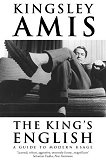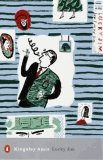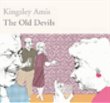
|

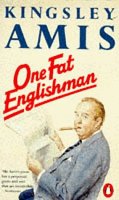
If you want to buy this book second hand
leicht vergilbt (Penguin paperback),
send me an eMail
As this is a book which is out of print,
the price of it is € 10 incl. postage.
The story:
Roger Micheldene, an English publisher, is on the loose in the U.S. He spends an October week shuttling between
New York and Budweiser College in Pennsylvania. This exercises all his British appetites...snobbery, gluttony,
anger, sloth and lust.
But Amis roasts Americans as well and serves us familiar dishes, though in a piquant sauce: the precocious
undergraduate author of a far-out novel, an earnest young priest, and an alcoholic literary agents
nymphomaniacal wife.
"They are all presented with glee and gusto and the keenest wit, but it is Roger Micheldene--at once a
prototype of the insufferable Englishman and an individual with sufficient humor to win our sneaking sympathy--
who dominates a supremely entertaining comedy of bad manners."
Extract from book:
"Roger began eating. There was a roll-basket on the table near him, its contents hidden by a napkin.
Underneath this were lengths of hot Italian bread soaked in garlic butter. He decided he would not eat this,
and then suddenly found he had started to. His decision to eat only one piece went the same way. By the time
the Southern fried chicken arrived from the gloved hand of the Negroe mad it was plain to him that he might as well
be hung for a fat-tailed sheep as a lamb. With the chicken there were turnips, spring onions - and corn on the
cob with more butter. A razor-blade embedded in a wooden handle for sclicing the cobs and a paint-brush affair
for spreading the melted butter on them were passed from hand to hand. Roger used both instruments a lot.
While Ernst and Parteger, who was sitting opposite, filled him in on what terrible courses of study were
available at Budweiser (College), Roger concentrated on his food. It was the least he could do for something that
was bringing his coronary nearer at such a clip, that was already, he sensed, sidling irremovably into his paunch
and his neck and his bosom. Let it. As he was waiting for his helping of blueberry pancakes with fresh cream
and Wisconsin cheddar, the thought of dieting brushed feebly at his mind like an old remorse. He was aware that
just eating a little of what he did no fancy would sooner or later do him good in the sexual chase. This idea had
been brought sharply into focus at a fellow-publisher's party the previous year. Somebody's secretary had told him
that what he wanted was all right with her on the understanding that he brought his block and tackle along.
Five days later, sipping a half-cup of sugarless and milkless tea to round off a luncheon of a lightly boiled
egg with no salt, a decarbohydrated roll resembling fluff in plastic, and a small apple, he had made up his mind
for ever that, if it came to it, he could easily settle down to a regime of banquets and self-abuse. He sent his palte up
now for a second helping of pancakes and put three chocolate mints into his mouth to tide him over. Outside every
fat man there was an even fatter man trying to close in.
With the Gaelic coffee, surmounted by half an inch or so of chilled cream, he felt his survival till breakfast
guaranteed and ceremoniously produced for him by Joe."
About the author:
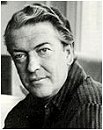 The only son of a business clerk, Amis was born in 1922 in London. He was educated at the City of London School
and St. John's College, Oxford University, where he became acutely aware of his lower-middle-class origins.
After service in the army with the Royal Corps of Signals, he completed his university studies and worked as
a lecturer in English at Oxford, Swansea, and Cambridge, which provided the academic settings for many of his
largely autobiographical stories.
The only son of a business clerk, Amis was born in 1922 in London. He was educated at the City of London School
and St. John's College, Oxford University, where he became acutely aware of his lower-middle-class origins.
After service in the army with the Royal Corps of Signals, he completed his university studies and worked as
a lecturer in English at Oxford, Swansea, and Cambridge, which provided the academic settings for many of his
largely autobiographical stories.
Best known for his satiric novels, Amis burst onto London's literary scene as a poet, with the collections
Bright November, (1947) and A Frame of Mind (1953). During this time, Amis was part of "The Movement," an
anti-sentimentalist group of British poets whose members included Robert Conquest, Elizabeth Jennings, and
Philip Larkin. Larkin and Amis became fast friends, hanging out in pubs, listening to American jazz, and
mocking pretension and pomposity in all its forms. They were reacting against the clean-living intellectualism
of the 1930s and the snobby aestheticism of the 1920s, known as the "Brideshead years," after Evelyn Waugh's
novel. Larkin and Amis remained close throughout their lives, engaging in spirited correspondence (recently
collected in The Letters of Kingsley Amis) rife with pun-filled riffs on literature, women and work.
Their ongoing dialogue, in which Amis developed his chummy, wise-cracking style, helped Amis find the tone
for his classic university farce Lucky Jim (1954), his first published fiction, whose main character would
reappear in That Uncertain Feeling (1956) and I Like It Here (1958). When Jim went on to be a best-seller,
Amis found himself labeled one of the "Angry Young Men," a group of postwar British writers from the lower
classes bent on subverting the establishment. His compatriots included John Osborne, John Wain, Colin Wilson,
and John Braine. While many of these writers have been forgotten, Amis's sharp social and sexual commentary
have endured.
In 1983 a jury commissioned by the British Book Marketing Council declared Take a Girl Like You one of the
dozen best novels written in English since 1945. In 1986 Amis won the Booker Prize for The Old Devils. Closely
mirroring his own experience of mid-life stock-taking, the story follows four married couples whose are forced
to revisit their past when an old friend and semi-famous Welsh man of letters reappears in their lives.
This wistful, nostalgic book is considered by many to be Amis's most sentimental work.
Over the course of his 50-year career, Amis produced more than 20 acerbic, ironic novels. He famously debunked
truisms of English life and British character, often training his merciless eye on friends and family, turning
them into fodder for his fiction. His skepticism skewered the haughty posturing prevalent in the university
world; his honesty pulled the rug out from under upper-class traditions; and his hatred of pretension led him
to discredit liberals and conservatives alike. Rounding out Amis's literary portfolio is an array of nonfiction,
criticism, poetry, and anthologies that covers topics as diverse as drinking and detectives.
In 1948, while a junior lecturer at Swansea, Amis married Hilary Bardwell and had three children, including
the acclaimed novelist Martin. Famously promiscuous, Amis was matched in his exploits by Hilly, who nearly ran
off with a newspaper man in 1956. They divorced when Amis met and fell for novelist Elizabeth Jane Howard
(The Cazalets) at a sex and literature conference in 1965. Their marriage lasted until 1983, when Amis's
drinking and impotence made life with him unlivable. Unable to tolerate life on his own, Amis returned to
Hilly, now inconveniently married to Lord Kilmarnock. The unlikely trio struck a bargain -- Amis would pay
the bills in exchange for room and board -- and the arrangement was agreeable to all.
Amis spent his last years changing his political stripes from left to right and writing scathing criticism
of nearly everything that crossed his path. He was knighted in 1990 and died in 1995 at the age of 73.
Buchdaten:
ONE FAT ENGLISHMAN by Kingsley Amis
Sprache: Englisch
Taschenbuch - Simon & Schuster
Erscheinungsdatum: 1. April 1989
Auflage: Reprint
ISBN: 0671671197
Preis: € ???
If you want to buy this book second hand (paperback), send me an Email.
As this is a book which is out of print, the price of it is € 10.
More works from the same author:
zurück zur Übersicht
|


 The only son of a business clerk, Amis was born in 1922 in London. He was educated at the City of London School
and St. John's College, Oxford University, where he became acutely aware of his lower-middle-class origins.
After service in the army with the Royal Corps of Signals, he completed his university studies and worked as
a lecturer in English at Oxford, Swansea, and Cambridge, which provided the academic settings for many of his
largely autobiographical stories.
The only son of a business clerk, Amis was born in 1922 in London. He was educated at the City of London School
and St. John's College, Oxford University, where he became acutely aware of his lower-middle-class origins.
After service in the army with the Royal Corps of Signals, he completed his university studies and worked as
a lecturer in English at Oxford, Swansea, and Cambridge, which provided the academic settings for many of his
largely autobiographical stories.